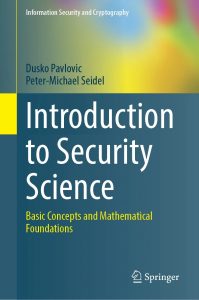Synopsis:
As social, economic, and political processes propagate through computational networks, computational processes have ever broader social, economic, and political repercussions. This makes security into one of the central problems of computer science.
 While traditional sciences are concerned with truth, as confirmed by experiments, modern sciences are increasingly also concerned with lying and deceit, as enabled, implemented, countered, and prevented through network computation. Security Science gathers methods and results of research into adversarial computation. This introductory course aims to familiarize students with the emerging foundations of this new science and prepare future computer scientists for its rapidly evolving applications.
While traditional sciences are concerned with truth, as confirmed by experiments, modern sciences are increasingly also concerned with lying and deceit, as enabled, implemented, countered, and prevented through network computation. Security Science gathers methods and results of research into adversarial computation. This introductory course aims to familiarize students with the emerging foundations of this new science and prepare future computer scientists for its rapidly evolving applications.
Course:
-
- Time: Fridays 1:30-4 PM
- Place: POST 319
- Textbook: Introduction to Security Science
- Lecture notes provided
Lectures:
- Introduction: Security concepts
- Static resource security: access control and multi-level security
- Dynamic resource security: authorization and availability
- Channel security: noninterference and covert channels
- Privacy
- Trust
- Security risk and investment


